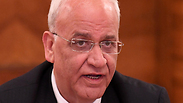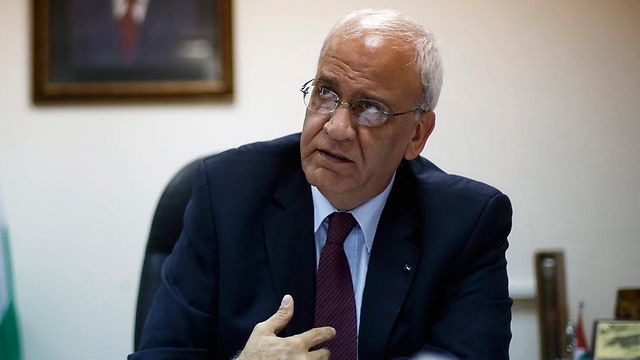
Saeb Erekat
Photo: AFP

Chances of Israeli lung transplant for Erekat are slim
Despite report of Palestinian chief negotiator's addition to transplant waiting list, the Ministry of Health clarifies only Israeli citizens may register to national waiting list. Erekat is not an Israeli citizen and will therefore enter at bottom of list.
Saeb Erekat, the Palestinian top negotiator with Israel for the past 20 years, has been suffering from a debilitating lung disease and is on the lung transplant waiting list in both Israel and the US. But officials at the Ministry of Health and the National Transplant Center have made it clear only Israeli citizens may register to appear on the national waiting list.
The transplant precedence order is determined solely according to medical criteria, without exceptions, with transplants going to the patient in most dire medical need.
In cases where no Israeli patient is found suitable to receive the organ in question, it may be transplanted in someone who is not a citizen of Israel, subject to agreement from the donor's family. These cases are considered extremely rare.
Should a suitable donor be found for him, Erekat will undergo an operation replacing his lungs—or parts of them—with partial or complete lungs from the donor's body.
Lungs are donated by a deceased person whose family agreed to the donation. According to Israeli law, the family isn't made aware who the organs go to, and to avoid organ trading it cannot condition the donation on a specific person receiving it. If a decision to donate it made, selection is made purely on professional medical considerations by the National Transplant Center.
The Ministry of Health has received a request to include Erekat in the waiting list ex gratia. For legal reason, the ministry couldn't acquiesce to the abnormal request out of its obligation to preserve the sanctity of organ allocation processes. Erekat can therefore only accept donations through the protocol pertaining to non-citizens.
Erekat, 62, suffers from pulmonary fibrosis, which is characterized by the development of scars in lung tissue that makes it difficult for them to function properly. The disease manifests itself in shortness of breath, coughing and loss of the lungs' ability to transfer oxygen to the body. This condition has no cure, and the only way of saving the life of someone afflicted by it is a lung transplant.
A candidate for a lung transplant such as Erekat is almost always someone who suffers from a terminal lung illnesses, and whose life expectancy according to doctors is no more than 12-18 months.
Despite the immense deficit of organs for transplant, not every lung is suitable for transplant. Lungs from donors who were heavy smokers, suffered thorax contusions or an active lung infection or have undergone prolonged artificial respiration, for example, cannot be used. The donated lung's condition may nevertheless be improved using medication.
In any case, doctors can always match up donor and patient to examine the size of the lung and blood type before deciding to operate.
Even if Erekat himself is somehow able to ascend to the top of the waiting list, there's no guarantee he'll receive the nearest lung transplant, but will have to wait until a donation is found that's both suitable to his exact case and deemed to not be needed by any Israeli citizen, the likelihood of which is rather small.
Erekat has been suffering from pulmonary fibrosis for over a year with the doctors treating him in Israel recommending a transplant after his body built up a resistance to medication.
The transplant waiting list reportedly has 70 patients waiting their turn. Israel performs 50 lung transplants every year, more than two thirds of them performed in Petah Tikva's Beilinson Hospital.
















